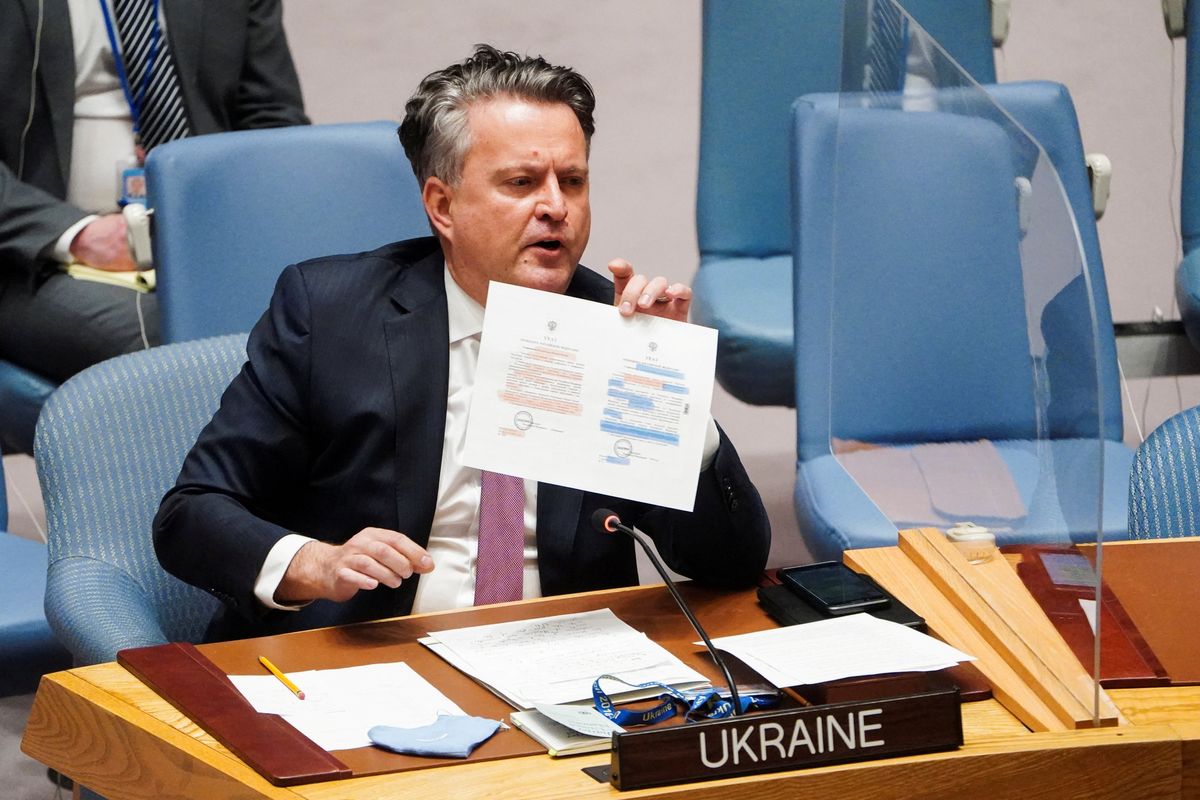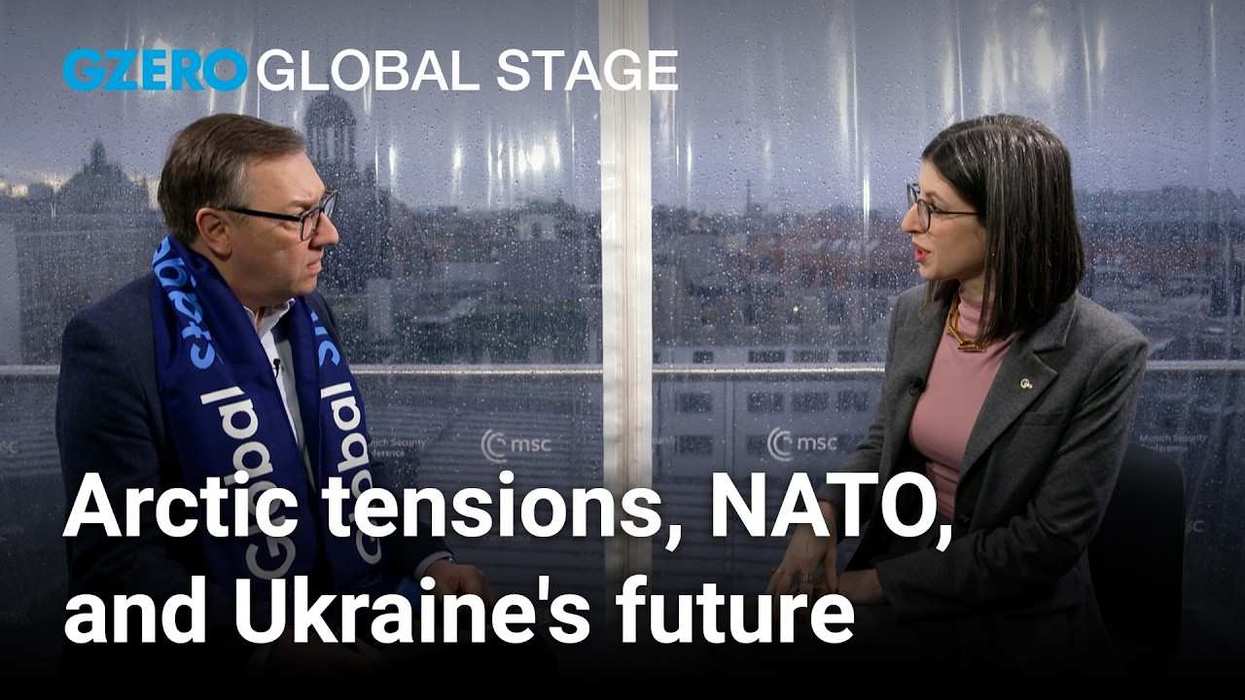While Ukraine’s soldiers are fighting on the battlefield, Sergiy Kyslytsya is on the front lines of Kyiv’s diplomatic offensives in New York. Kyslytsya, a career diplomat, is Ukraine’s permanent representative to the United Nations.
We spoke with him this week about what happens if Ukraine’s spring counteroffensive fails, who is ultimately responsible for making Russia a partner for peace, and how he would explain the case for supporting Ukraine to an ordinary New Yorker.
Our conversation has been edited for length and clarity.
Let’s start with some recent news from your neck of the woods – Russia has just taken over the rotating presidency of the UN Security Council. What is it like to work with a body that is now chaired by a country that invaded your own?
Nasty things tend to happen under every Soviet and Russian presidency of the UNSC. In 1991 the Soviet Union was president when the Soviet Union’s permanent membership seat was, in our opinion, transferred illegally to Russia. It was during the Russian presidency that Putin launched the full-scale invasion of Ukraine last year. And now we have Russia’s first presidency since then.
In general, the alleged war criminal Putin in charge of the Security Council is by itself quite morally unacceptable. There are countries who understand that, but they are not ready to take actions against it. And I think that the primary responsibility lies on the shoulders of the UNSC’s permanent members.
What do you mean by that?
Among the council’s 15 members, there are four permanent members [besides Russia]. And they are clearly very reluctant to do anything that even in theory may undermine their own powers and rights.
Let’s talk about the current situation in Ukraine. Kyiv has spent months preparing a spring counteroffensive. What, in your view, is that counteroffensive meant to achieve?
It is meant to achieve the de-occupation of the temporarily-occupied territories and to break the neck of the Russian army in Ukraine.
When you say that the aim is to liberate all of the temporarily-occupied territories, does that include Crimea?
It does. Nobody thinks this will be easy to do, but what seems impossible is quite feasible should the Ukrainian army be equipped and receive all necessary weapons and ammunition.
President Zelensky has already received a lot of advanced weapons from the US and EU – even Slovakia and Poland have agreed to send fighter jets recently. What else do you think is missing?
When we speak about fighter jets, we’re missing F-16s. The MiG-29s [which Poland and Slovakia have sent] are not fit to achieve the military goals that must be achieved for the full de-occupation of Ukraine. So it's not only about providing us with outdated aircraft. We appreciate it very much, but from what I hear from our military needs, MiG-29 aircraft cannot be the decisive force from the air.
If the counteroffensive this spring doesn’t fully liberate all of Ukraine, what happens next? Is it realistic to expect we’d start to see some movement towards peace talks?
I don't think it's realistic unless Russia changes its attitude and Russia accepts the principles that are both in the peace formula that President Zelensky put forward [at the G-20 meeting] in Bali last year, and the recent resolution of the General Assembly. So I think that negotiations, whatever negotiations, can only take place if Russia accepts those principles.
And if not, then the conflict just goes on indefinitely, or?
If not, we will continue to de-occupy our territories.
As you’ve said, that depends on continued support from the US. But there’s already some evidence of Ukraine fatigue among the public, and some politicians are looking to exploit that. Florida Gov. Ron DeSantis, who is positioning himself for a presidential run in 2024, has already criticized the White House’s “blank check” for Ukraine and suggested it’s not in the US national interest to support Kyiv. Are you worried about this?
Nobody is sending blank checks to Ukraine. The discussions are very thorough. The public may not know the full content of the discussions because some of them are classified, but they will be declassified according to the rules and norms that exist both in this country and in Ukraine.
From my previous experience and based on the years I have spent in the US, both privately and as an official, no matter what's going on during the election campaign, Ukraine will enjoy bipartisan support after the elections because Russia and Putin in particular are so toxic that there is practically no one in his or her right mind in in the military, in the Democratic party or the Republican Party who would like to associate themselves with the Putin regime.
And it is in the fundamental national interest of the United States that Putin does not win this war. The conflict that Putin launched is not only about Ukraine – it’s an assault on the entire Transatlantic community. The Transatlantic community cannot afford to lose this war.
Right but how do you explain that to an ordinary person? Like an ordinary person walking down the street in New York?
It's very easy to explain. As long as it is the Ukrainian soldiers that fight in the battlefields, this is the safest and the cheapest way for the United States and other Transatlantic members of the community to ensure their own security.
And if a member of the public is willing to engage in this conversation, it’s very easy to explain that no matter how impressive the numbers look, in the general picture of the U.S. budget, the percentage [of money going to Ukraine] is very low.
Even if the United States stops helping Ukraine, the most serious economic issues or social issues in the US would not be resolved.
However, if Ukraine fails, then indeed, the Transatlantic community – including the United States – would need to be spending much more to ensure their own security and defense.
As far as the security and defense of Ukraine go, what would a sensible and durable security arrangement for Ukraine be?
The only serious way to ensure the security of Ukraine and Europe is to let Ukraine join NATO as soon as possible after the military defeat of Russia in Ukraine. We should have no illusions about any memoranda, any treaties, any arrangements with Russia. I mean, let's be realistic. Russia will need at least 20 years to evolve into something that will be safe enough to return to the previous forms of interaction with.
What does that look like? How does that happen?
My humble private opinion is that the military defeat of Russia in Ukraine is not the ultimate victory in this conflict. Because even when the Russian troops have been pushed out of Ukraine’s internationally recognized borders, Russia will continue to be an imminent threat, not only for Ukraine but for the transatlantic community.
The question is, how do we change or how do we facilitate this change in Russia so that the government and the Russian public are not ready to attack again?
Russia will never be occupied. So it will not be possible to launch a process of de-Putinization under an occupation or under the supervision of foreign governments.
It’s up to the Russians to decide if, how, and when they may go back to the early nineties of the last century, the beginning of their democratic process. And that will take ages in Russia because they have no tradition or history of truly democratic elections.



















